|
|
|
Sort Order |
|
|
|
Items / Page
|
|
|
|
|
|
|
| Srl | Item |
| 1 |
ID:
146237
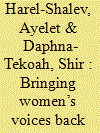

|
|
|
|
|
| Summary/Abstract |
In exploring wars and conflicts, Critical Security Studies and Feminist International Relations (IR) use various methodologies, including nontraditional avenues of inquiry. This study follows these theoretical and methodological perspectives and suggests a methodology that will contribute to contemporary debates in IR. Specifically, the study offers an innovative application of Carol Gilligan’s method, the “Listening Guide” (LG). The research demonstrates the utility of the LG analysis in uncovering additional forms of knowledge regarding armed conflicts. The context for analysis is women in combat. The implementation of the LG assists us in uncovering various voices, representing different aspects of the women combatants’ experiences in a conflict zone. In this study, this analytical tool, applied to conduct narrative research, enabled the researchers to hear both multiple and silenced voices. We suggest that this methodology should continue to be used in future studies and incorporated into the Security Studies and IR toolkit.
|
|
|
|
|
|
|
|
|
|
|
|
|
|
|
|
| 2 |
ID:
146244
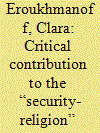

|
|
|
|
|
| Summary/Abstract |
This review essay explores the security–religion nexus by evaluating two books contributing to the “restorative turn” in International Relations (IR) theory and practice. While Securing the Sacred and Religion in the Military Worldwide “bring religion back” into the realm of international politics and security, I argue that the analytical purpose of the books is problematic, given that both studies imply a normative logic to the security–religion nexus. This is difficult for two reasons. First, it rests on an assumption about the resurgence of religion in the world and the conduct of research. Second, it furthers a powerful discourse in which religion has a rightful place in an orderly society. I therefore provide a critical contribution to the security–religion nexus by urging scholars of religion and security to embrace their underlying normative positions.
|
|
|
|
|
|
|
|
|
|
|
|
|
|
|
|
| 3 |
ID:
146241
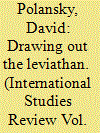

|
|
|
|
|
| Summary/Abstract |
Neo- or structural realism is famously said to lack a theory of the state. Resisting the urge to devise one, I would instead argue that structural realist theories—most notably the original theory of Kenneth Waltz—implicitly contain a theory of the state. What has eluded commentators is that this theory is prescriptive rather than descriptive. Insightful readers like Goddard and Nexon and Rathbun have unpacked Waltz’s (nondeterminative) prescriptions for state behavior in the international system. This article will unpack those prescriptions for state order. Two conclusions emerge from this analysis: (i) structural realism implicitly reads essential features of the modern state into what are otherwise proclaimed to be nonspecific like units in anarchy and (ii) the ideal-typical state prescribed by Waltz’s theory most resembles Hobbes’ Leviathan. Making these connections explicitly may indicate why certain historical systems are a better “fit” for Waltz’s analytical construct and also serves to properly situate structural realist theories within the larger framework of political (not international relations) liberalism.
|
|
|
|
|
|
|
|
|
|
|
|
|
|
|
|
| 4 |
ID:
146243


|
|
|
|
|
| Summary/Abstract |
Recent U.S. military engagements in the Middle East have drawn public attention to the thorny issue of religion in the armed forces but the scholarship on religion in the military lags far behind these developments. Scholars have not developed a coherent research program around the challenges that religion faces in the armed forces or the religious issues that soldiers, commanders and military institutions grapple with on a daily basis. This papers seeks to initiate a scholarly conversations about the roles and effects of religion in the armed forces. I propose exploratory hypotheses that touch on some key themes that such a research program might cover, at three levels of analysis. At the institutional level, scholars should interrogate the relationship between religious norms and constitutional challenges in society and in the military. At the unit level, research should explore the impact that chaplains and group rituals have on unit morale. At the individual level, this research program should initiate a comprehensive investigation of the effects of individual religious practices on the mental health of soldiers and, in turn, the impact that participation in combat has on soldiers' religiosity. These illustrative hypotheses are far from exhaustive and should be regarded as invitations for future exploration.
|
|
|
|
|
|
|
|
|
|
|
|
|
|
|
|
| 5 |
ID:
146238


|
|
|
|
|
| Summary/Abstract |
International Relations (IR) scholarship represents the pursuit of theory about how the world works or ought to work. Yet despite this broad orientation of the field, the process of theory building itself remains challenging. There is abundant professional guidance on how to refine and test a theory once it has been created, but how do we get from a vague interest in some area of IR to a specific argument that explains or interprets a particular aspect of international politics? This article aims to refine the theorization challenge by taking stock of—and advancing—the debate over the relationship between inductive and deductive inference in IR theory building. It begins with an analysis of the short shrift still given to induction by many in the positivist IR community—a tendency that follows from the criticism of inductive theory building contained in Kenneth Waltz’s Theory of International Politics (1979) and its enduring legacy, despite Waltz’s own professedly nonpositivist approach—before progressing to consider the limits of a purely deductive approach to theorization. This article concludes that “creative-deductive” theory possesses key strengths, including its parsimonious and generalizable explanatory reach, and its truth-preserving quality. However, given the endogenous feedback relationship that exists between theoretical premises and empirical evidence, this article argues that it is only once we accept that induction is an intrinsic and unavoidable component of IR theory building that we can truly seek answers to the most important questions of international politics. Accordingly, IR scholars should strive to use the two in tandem as they set about developing new theory.
|
|
|
|
|
|
|
|
|
|
|
|
|
|
|
|
| 6 |
ID:
146239
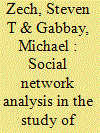

|
|
|
|
|
| Summary/Abstract |
Research using social network analysis to study terrorism and insurgency has increased dramatically following the 9/11 attacks against the United States. This research emphasizes the importance of relational analysis and provides a variety of concepts, theories, and analytical tools to better understand questions related to militant group behavior and outcomes of terrorism and insurgent violence. This paper defines key network concepts, identifies important network metrics, and reviews theoretical and empirical research on network analysis and militant groups. We find that the main focus of existing research is on organizational analysis and its implications for militant group operational processes and performance. Few studies investigate how differences in network structure lead to divergent outcomes with respect to political processes such as militant group infighting, their strategic use of violence, or how politically salient variables affect the evolution of militant cooperative networks. Consequently, we propose a research agenda aimed at using network analysis to investigate the political interactions of militant groups within a single conflict and provide illustrations on how to pursue this agenda. We believe that such research will be of particular value in advancing the understanding of fragmented civil wars and insurgencies consisting of multiple, independent militant groups.
|
|
|
|
|
|
|
|
|
|
|
|
|
|
|
|
| 7 |
ID:
146240


|
|
|
|
|
| Summary/Abstract |
This article argues that private information plays an important role in explaining long wars. Existing rationalist explanations of long, intensely fought wars focus on commitment problems rather than private information as the cause of such wars. Commitment-problem explanations of long wars claim that while private information can explain short wars, battles and exchanges of offers for settlement should quickly reveal private information, thereby leading to an early peace. Commitment problems, on the other hand, may take years to resolve and therefore can explain long, intense wars for unitary actors. However, while commitment problems are an important explanation for long wars, private information can endure deep into lengthy conflicts because states create new private information during wars and because states often disagree about their relative ability to bear costs rather than their relative military capabilities. I explore this argument in cases on the end of the First World War and the Iran–Iraq War.
|
|
|
|
|
|
|
|
|
|
|
|
|
|
|
|
| 8 |
ID:
146242
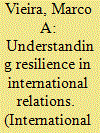

|
|
|
|
|
| Summary/Abstract |
Born more than half a century ago, the Non-Aligned Movement (NAM) embodied the collective identity and aspirations of newly independent nations in Africa and Asia. Since the end of the Cold War, NAM’s relevance has been brought into question given the passing of the geopolitical context that motivated its creation. More recently, in the wake of the NAM’s Tehran meeting in August 2012, myriad analyses have yet again questioned NAM’s political effectiveness and legitimacy as an ideologically coherent vehicle for developing countries’ definition of common positions on a host of global issues. Drawing from the literature on ontological security, I argue that NAM’s enduring relevance, legitimacy, and institutional resilience are the result of some of its key member states’ adherence to the core principles of nonalignment. Notwithstanding the profound changes in both the international system and in the political and socioeconomic contexts of most of NAM’s members since the movement’s creation, these principles have fundamentally shaped their postcolonial identities in international relations. I claim that NAM’s contemporary resilience derives from the stabilizing sense of continuity that the movement provides by reifying developing states’ shared identity in an increasingly de-centered and uncertain global order.
|
|
|
|
|
|
|
|
|
|
|
|
|
|
|
|
|
|
|
|
|